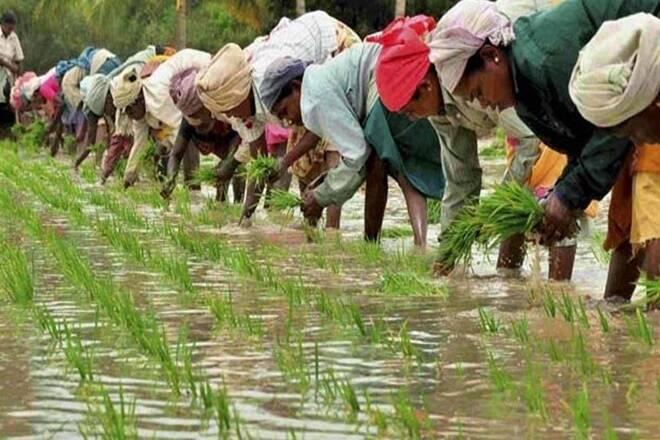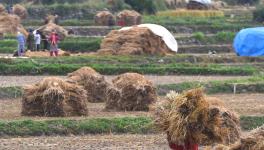Why Small Cultivators Lose in Contract Farming Deals

Representational Image. Image Courtesy: The Financial Express
Contract farming has been expanding in recent decades, and India seems set to join the race with recently enacted laws, guidelines and rules. The experience with contract farming in developed as well as developing countries shows how small and ordinary farmers have fared badly on the whole under these arrangements. In particular we need to examine those contracts which tie farmers to big multinational companies as it is these corporates which are expanding at a very fast pace in the world food and farming system.
The first thing to notice about these contracts is that they are generally drawn between two very unequal partners. On the one hand there is a multinational company with every legal and financial resource at its disposal; on the other hand is the small cultivator with perhaps just some basic literacy and often with hardly any understanding of legal issues, forget complications. The small farmer is often so hard-pressed, economically speaking, that he finds it difficult to resist an advance or a loan, and may overlook longer-term adverse implications.
Contracts generally mention strong qualitative requirements of the crop that is to be delivered according to its terms. Generally, it is the company representative who determines how much of a crop satisfies the qualitative norms that are also set by it. Hence, a significant part of the crop may fail to get the price mentioned in the contract and has to be sold at a very low rate, particularly in the case of perishable produce, which needs to be sold quickly. As many companies dominate specific cultivations, they often function in practice as monopoly buyers of particular crops. Therefore, they not only set the qualitative norms but their decision has to be accepted as there are hardly any other buyers for a farmer’s produce.
A second related factor is that of technology and the input packages, which are also determined by the contracting company. As quality norms are important in contracts, corporate buyers argue that the techniques and inputs they select have to be followed by the farmers. Often, pesticides, fertilisers and equipment are those which the same company or its collaborators manufacture or produce. Bound by the contract’s terms, farmers are often denied the freedom to explore lower-cost alternatives.
Third, a company is only interested in growing the crop it needs (or the crop cycle it needs) regardless of its impact on soil fertility, sustainable water use and other important environmental factors. While time-honoured crop rotations and mixed farming systems generally keep in view all these factors, a company’s engagement with a village lasts only for a few years. During its involvement it is interested in the procurement from the village and ensuring it is making a profit. What happens after this to the land, water and environment of the village is not its concern.
Once contract farming spreads widely in a country or a region, the chances that agriculture will move away from real food and nutrition needs or food security increase significantly. Under farm contracts, what companies need will be produced as per the global demand and availability of raw material and other requirements of the companies. There are chances, therefore, that farming will move from local food and nutrition needs to fads and fashions in food and consumption.
Last but not the least, these companies involve middlemen or agents across vast rural areas. These agents are generally chosen for their powerful position in villages and their political connections. Hence, several groups of powerful collaborators are created who identify their interests with those of companies and who hinder the unity of farmers. Due to their increasing power and the growing difficulties of ordinary cultivators under unfair contracts, these powerful collaborators are able to buy more land, again at the expense of small farmers. The entire system is accentuating rural inequality.
In the United States, one sector in which contract farming grew very rapidly (in the seventies and eighties) is that of poultry farming. A widely quoted report on this high-growth phase in Northern Alabama, written by George Anthan and published in Des Moines Register, says, “The farmers I talked to said that every time it looked like they were going to get the loan paid off, the integrators would come up with a new ‘improvement’ like gas heater, insulated chicken houses and automatic feeding equipment. Once in debt, the farmers had to stay in business, but to stay in business they had to get deeper in debt. One of the farmers described himself and other poultry farmers as the ‘new slaves’…”
Another widely discussed study of contract farming in the context of Zamora and Jacona areas of Mexico was published as a book, Strawberry Imperialism: An Enquiry Into the Mechanisms of Dependency in Mexican Agriculture, by Ernest Feder. This study sees the impact of contract farming for growing strawberries in the form of a system of extreme inequalities where a few powerful local persons become collaborators and partners in the exploitation of a large number of poor seasonal workers, including a very significant number of women and children. There are acute health hazards from excessive exposure to pesticides and children are highly vulnerable.
Some time back this writer saw another system of contract farming for Bt Cotton seeds based on exploitation of Adivasi farmers (as well as children of their families) in Kotra area of Udaipur district in Rajasthan. Farmers here said that their payments are based on an opaque system of getting approval for seeds, a system over which they have absolutely no control and they have to just accept the pass or failure rate. This can sometimes lead to wastage of months of labour, they complained bitterly. There are stipulations regarding costly chemical fertilisers and pesticides they have to follow. Health hazards relating to pesticides are very acute, people said. Land fertility has suffered very adversely. Local food security and self-reliance based on growing staple food crops like wheat, maize, bajra and pulses has suffered badly. Despite all these adverse factors the system could survive because of the elaborate system of local agents put in place by companies and the ability of these agents to exploit their kinship ties and the need for a lump sum payment by economically distressed tribal cultivators.
All these factors have to be kept in mind before India embarks on a rapid expansion of contract farming. A model of farm development based on rapid expansion of contract farming is full of several pitfalls and perils and is certainly not advisable in the present context of India
The writer is a freelance journalist who has been involved with several social movements. The views are personal.
Get the latest reports & analysis with people's perspective on Protests, movements & deep analytical videos, discussions of the current affairs in your Telegram app. Subscribe to NewsClick's Telegram channel & get Real-Time updates on stories, as they get published on our website.
























